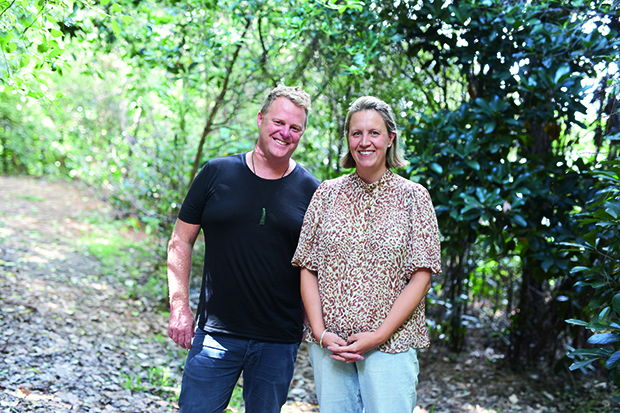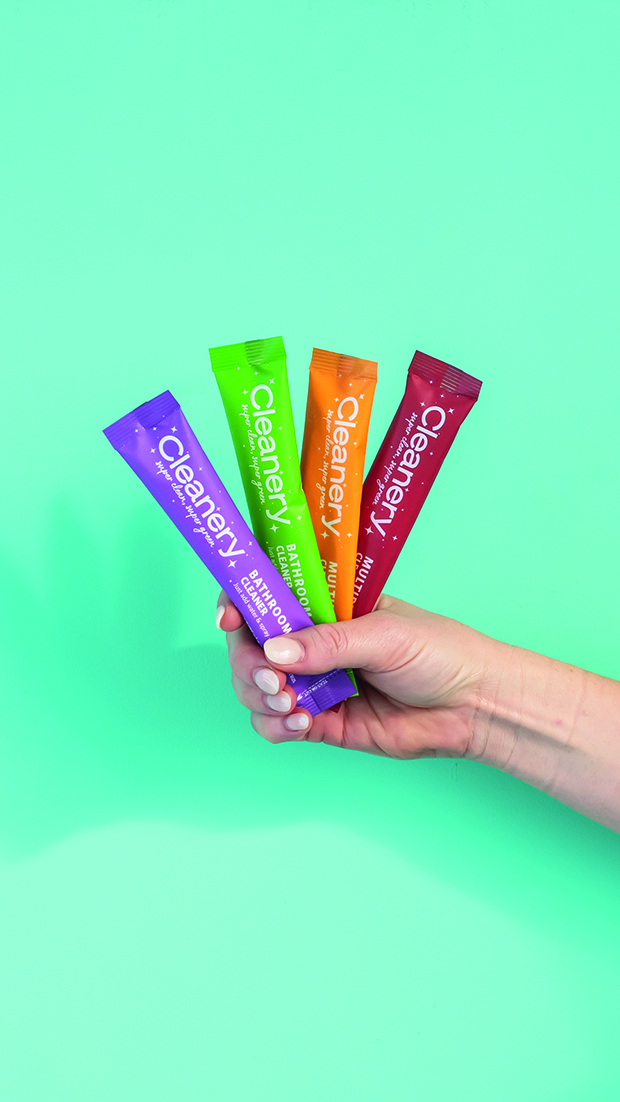The company marching into battle against cleaning product giants

Auckland start-up Cleanery is cleaning up the supermarket aisles, one sachet at a time.
Words: Peter Griffin
Take a look at the home cleaning products under the sink — they likely made a long journey to get there. Duck Extra Power Toilet Shield is made in Vietnam; Bam Easy-Off spray comes from Poland. Ajax Spray N Wipe hails from Australia.
That’s the norm for cleaning products made by the likes of S.C. Johnson and Colgate-Palmolive, consumer goods giants that ship liquid in bottles in large numbers worldwide. While the plastic bottles are often recyclable (grades 1, 2 and 5), the carbon footprint of producing and transporting about 30 billion bottles of house cleaner yearly is significant. Only a small fraction is recycled.
“If everyone only bought things without an excessive amount of packaging, there wouldn’t be as much rubbish around,” 14-year-old Mark Sorensen wrote in a school essay back in 1993.
Going on to become an engineer and business advisor, Sorensen continued to mull over the packaging problem that preoccupied him as a teenager. In March 2020, as the pandemic started to spread, he set up Cleanery with his wife, Ellie Brade, to do something about it.
The Auckland start-up, which raised $2.34 million in 2022 from investors, including the Climate Venture Capital Fund, Founders Advisory and Icehouse Ventures, makes powdered cleaning products sold in sachets. Simply add water to a reusable bottle, shake it up, and create a cleaning product from naturally occurring plant and mineral materials.
“When we were starting out, we realised it had to be a solution that would work for everyday humans, not just in the eco niche,” says Sorensen from the Auckland manufacturing plant where Cleanery’s formulations are made.
The 20-gramme sachets — ranging from the best-selling all-purpose cleaner to bathroom, glass and dishwashing powders — cost $4 each, or $9 for three, each making 500ml of cleaning solution. Brade says the priority was to offer an affordable alternative to big-name brands with no “green tax”. It also had to be highly effective as a cleaning agent.

Cleanery’s waterproof sachet weighs just one gramme and in New Zealand can be recycled via soft plastics schemes run by supermarkets.
Cleanery’s multi-purpose cleaning product performs well compared with a benchmark set by German testing association IKW. The couple went through a lengthy development process, working with a chemist and funding from government agency Callaghan Innovation, to find the right solutions. They ruled out a dissolvable tablet early on.
“A tablet has to be quite small to fit through a bottleneck,” explains Brade. “You are left with about three grammes of product. So, we shifted to powder, which gives us a pure product and the quantity needed to deliver an effective clean.”
A pivotal decision was to design and build a production facility rather than employ the services of a contract manufacturer. It means Cleanery can prototype new products quickly. “We can be incredibly fast and innovative,” says Sorensen. “And that is where the change will come from as a small start-up.”
The company’s dishwashing powder debuted late last year, and it has also branched out into personal cleaning products with a series of powder-based handwashes. With distribution into supermarkets across New Zealand via Foodstuffs, and Woolworths and Coles in Australia, it has achieved its aim of mass market availability.
The goal is to have products on shelves in United States supermarkets early in 2024.
“People are thinking a lot more about what they’re consuming, and I believe it’s only a matter of time before legislation will change things as well,” Brade says.
“You see these aisles and aisles of plastic bottles. But there’s momentum for change that we are hungry to be a part of.”
Headwinds: “We are a start-up business taking on the biggest companies in the world. That’s a challenge. A change in consumer behaviour is also needed. People are used to going and grabbing that bottle of Ajax from the shelf.”
Tailwinds: “Timing is on our side. Retailers are looking for these types of products. They can make money from them, consumers love them because they work, and they tick all sorts of sustainability and environmental boxes.”
Biggest priority: “The United States. It’s a massive market, and we have to get it right. We will take what we’ve learned from New Zealand and Australia and apply it over there.”
THE NUMBERS
Cleanery products produce 99% less waste and emissions than the traditional equivalent (single-use 500ml bottle)
Cleanery is B-certified and carbon positive — its carbon footprint is offset by 120% to scope 1, 2 and 3
5.37 million – plastic cleaning spray bottles are purchased in New Zealand supermarkets a year
7 million – bottles of hand soap and 7.6 million shower gel bottles go into the rubbish each year
71% – of New Zealanders believe cost is a barrier to being more sustainable
Love this story? Subscribe now!
 This article first appeared in NZ Life & Leisure Magazine.
This article first appeared in NZ Life & Leisure Magazine.

